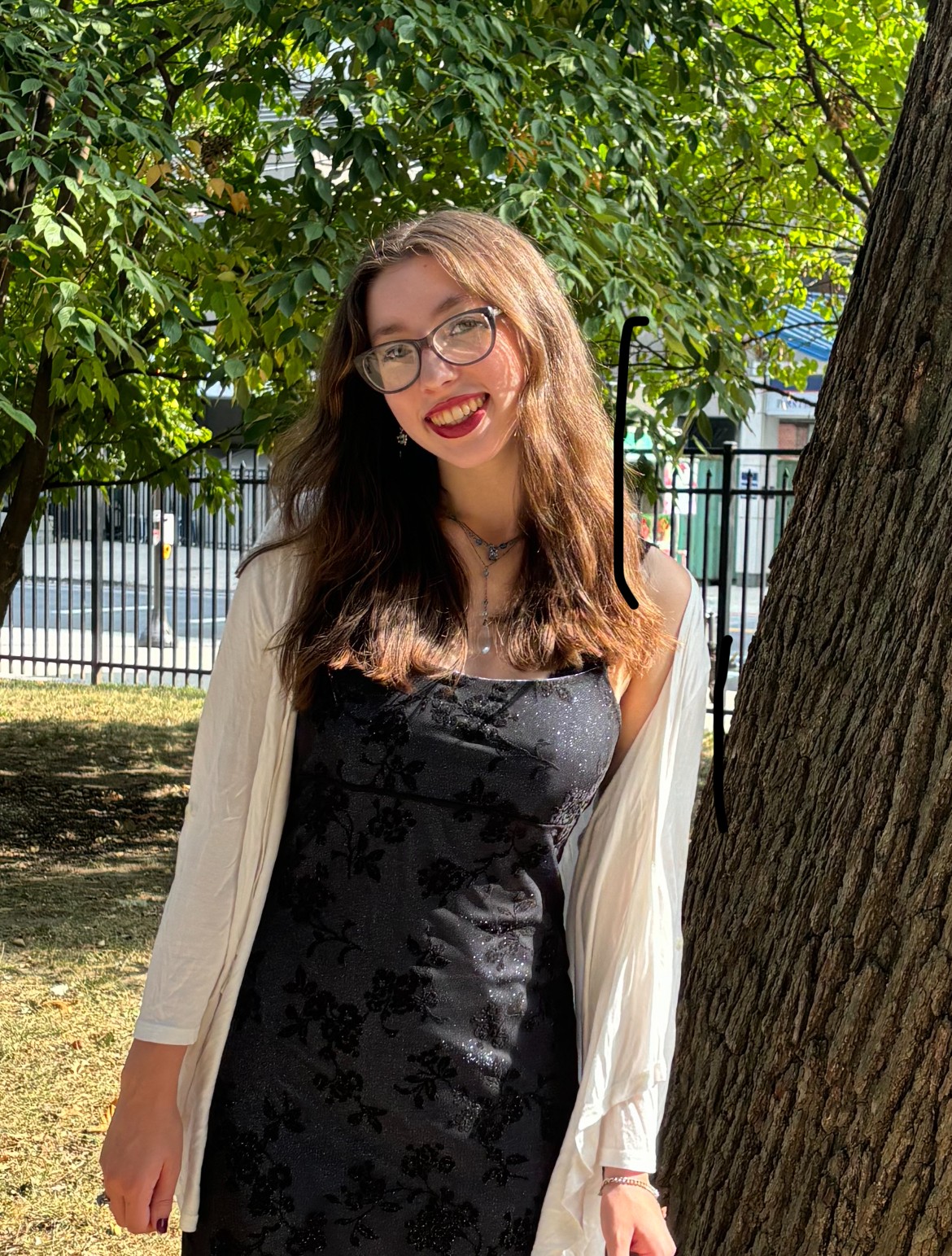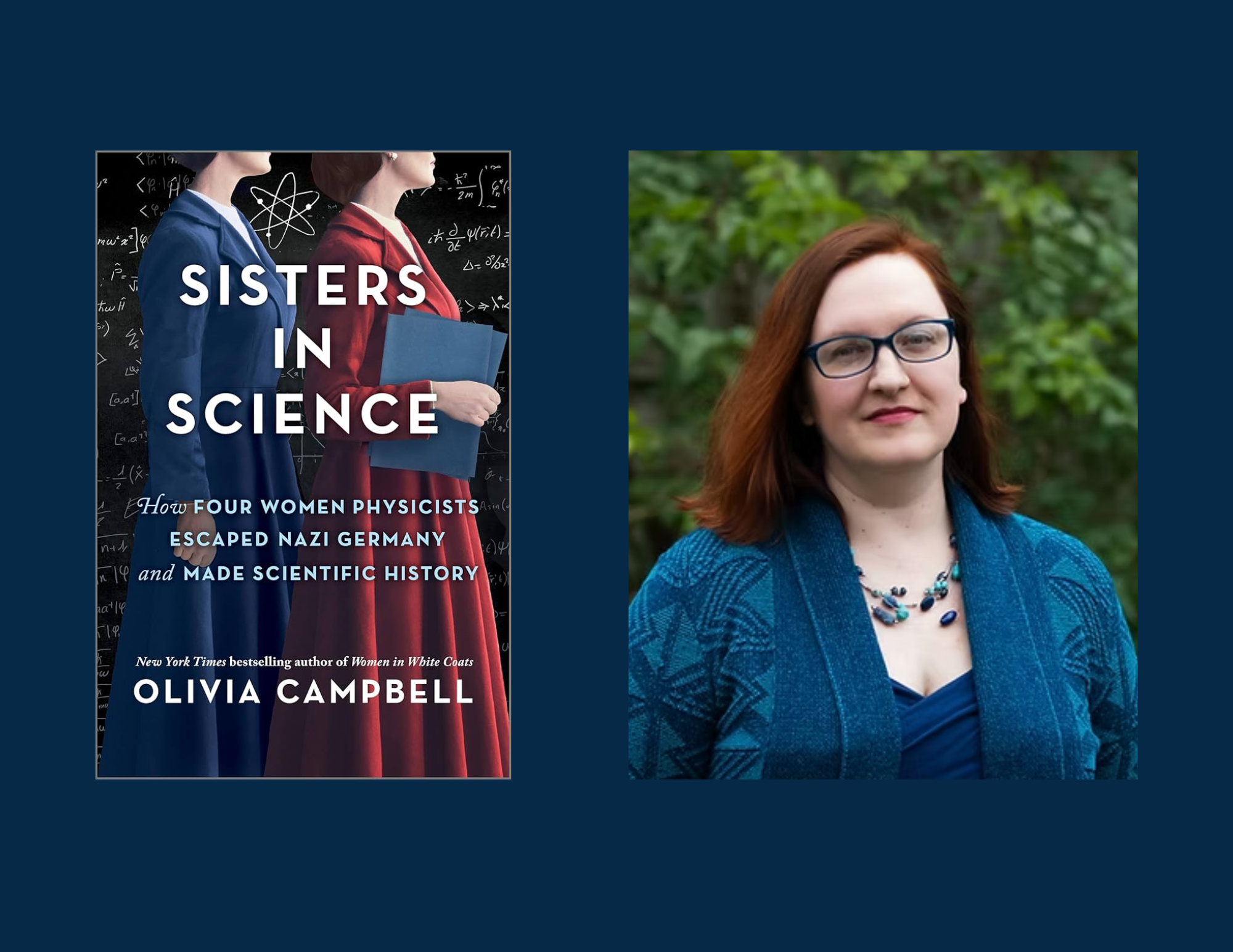Olivia Campbell’s second book, Sisters in Science, is set to come out December 31, 2024. Her first book, Women in White Coats, was a New York Times bestseller. Campbell’s articles have been published in the New York Times, National Geographic, and The Guardian. She lives in the Philadelphia area.
Emily Fedon: You have a book coming out at the end of the year in December, Sisters in Science, and I was wondering how you came up with the idea for the book. Did you start with the topic, the specific women, or something else?
Olivia Campbell: This was my second book, so my agent asked me to come up with a list of a few ideas and we’d send it to my publisher from my previous book to see if anything struck their fancy. For the one they ultimately chose, I got the idea from a project by Northeastern University. They had a project where they were looking at the women scientists in Germany during the Nazi era, tracking grants, who received aid from the US, who didn’t, who was able to escape. They collected so much amazing data on these women, so my idea when approaching this resource was that maybe it would be interesting to have a book about a woman scientist who escaped and one who didn’t, juxtaposing those two. Ultimately, what I found was four women who all escaped and knew each other. Some of them may not have ended up in the same sort of places, but they helped each other get out, so this was a more compelling narrative to me. So, it really just started with that data project, just combing that data for information about these women that had been lost in archives.
EF: Since this is your second book, how did it compare to publishing your first book? Was it easier or harder this time?
OC: Writing this book was significantly harder. I know that sounds counterintuitive. This was a much bigger project. My first book is about three women doctors who are among the first to get medical degrees in their countries and how they work together to found a medical school for women in London. The research was all in English, it was just three women, and there was a lot of stuff published about them. It was really just a matter of finding the good information and synthesizing it into a readable narrative. This time, I’ll say 90% of the resources are in German, and there was very little written about the women. The topic is physics, and I’m not familiar with physics. I’m not a scientist myself, but I feel like medicine is much easier to understand — I’ve been a health and medical journalist for fifteen years, so I definitely knew much more about that topic already. There’s also an additional woman, so it’s four instead of three. Then researching the Holocaust and what the Nazis did, it was difficult on many levels. It was difficult emotionally, and sometimes I just had to take a break and step away. There was one chapter where I discuss the women scientists that the Nazis murdered, and when it came to editing I would usually skip that chapter. Other aspects were much easier: I already have my publisher, and I’m working with the same people. The first book was a New York Times Bestseller, so there’s kind of a cloud over the second one. I also know what it’s like going through publication once before and knowing about dealing with radio or PR and all those things.
EF: In Sisters in Science, you talked about cycles of progress followed by regressive backsliding. I was wondering if you think we’re repeating these cycles now, and if maybe we’re doomed to repeat these cycles? In some ways there are connections from the book to present day, which is upsetting.
OC: That was very upsetting. The more research I did and the more I edited the book, the more I thought that this is happening right now sort of, especially with the women’s rights piece. You have these people that are super fierce advocates, and they want to push really far forward, so we might get a few steps forward from that hard push. Then everyone says, “we don’t like this,” “this isn’t working,” so we take ten steps back and erase the work. It happens, and it’s going to happen again. It sounds very alarmist, but honestly it doesn’t feel that way when you’ve done the research and look into the things that were said then and the things happening now. I have some essays about the parallels that will unfortunately be relevant now.
EF: I totally see that. On a lighter note, I had some other questions less related to the book – I was wondering how being a thesis advisor for science-writing students has changed your own approach to writing.
OC: It’s super fun. I love working with students, but not as a professor. It’s a great way to give editorial feedback and work on my own ideas. The last couple of theses I worked on were really fascinating topics, and I saw some very talented writers and learned a lot personally as well as professionally. I feel like the more I edit, the better I am at self-editing and the more I can step back and view work with an editorial eye. Then I can do that better with my own work. Once you get used to spotting where things go, it’s a lot easier to do for your own writing as well. It’s definitely made me a better writer.
EF: That makes perfect sense. Do you change your approach to writing at all when you’re writing a book compared to writing articles?
OC: I was petrified when I sat down to write my first book. I thought, I don’t know how to do this, this is so many words, and the most I’ve ever written is probably a 3000-word article. I basically had to tell myself that each chapter is like one or two articles pushed together, so I kind of tricked myself into seeing it for the smaller parts. I definitely use the skills I’ve learned in my journalism career in my writing of books. I’m skilled at doing interviews and picking out the best quotes to tell you about the subject and the person being interviewed. I have been good at transferring that skill to reading history, like someone’s diary or someone’s letters, to pick pieces that will tell you the most about who they were as a person and what they were trying to say. I think that’s part of why people like my books.
EF: I also was wondering how you decide how much detail to put into people’s work, especially when you’re writing about the physicists in Sisters in Science? It can be hard to strike the balance between too complex and too simplified.
OC: Exactly yes, you don’t want to talk down to people, but you don’t want current physicists to read your book also and say “she got all that wrong” or “this is way too juvenile.” It was very hard because a lot of the source material and biographies about these people had a lot of heavy science in them, and I was getting lost. I thought, I don’t want to lose people in this. As someone who isn’t a scientist, I felt like I was in a good position to read the studies and approach it from a perspective of where my audience would probably be in their knowledge of physics. I tried to use metaphors. My favorite metaphor wasn’t mine, but it was something I pulled from a science article about explaining nuclear fission as shooting raisins at a cake. Those images are a great way to explain it without dumbing it down, and it just makes it more fun. In my last couple rounds of edits, I did a read really being ruthless about cutting. I saved everything in a different document and asked myself if I wanted to reintroduce it or not. For a lot of that, I focused on the science stuff. I tried to make the science not quite so dense that your eyes start to glaze over but just enough to give you an idea of what they were doing and why it was important. I hope I struck that balance. It was definitely something I was thinking about as I was writing.
EF: Since you write so many articles about different historical eras, which one is your favorite?
OC: I tend to write about medieval, renaissance times a lot. I think that’s a really fascinating era for me. I really like the idea that during that time women were still taking on the profession of their family, like if the father died and there weren’t any sons, then she would take over the career. If he was a doctor, she would become the doctor. That’s just how it was, the apprentice style, and I think of how that has been lost with people going to university instead of apprenticing. I think that makes that era really fascinating to me, how women’s work has changed from that era to now.
Learn more about Olivia Campbell on her website here and pre-order her upcoming book here.

Emily Fedon is a fifth-year Drexel student majoring in chemical engineering and minoring in writing. As a student DJ, she has a weekly show, Finding My Marbles, on WKDU, Drexel’s student-run radio station. In addition, she’s the Public Relations Director for WKDU as well as the marketing liaison for Drexel’s student-run book club. In her free time, she likes to read, crochet, and take walks to her favorite local coffee shops.
